Navigating Canine Dental Care: A Comprehensive Guide to Dog Teeth Cleaning
Do you know that dental health is just as important for our canine companions as it is for us? As a responsible dog owner, you should prioritise keeping your dog’s teeth clean and healthy to prevent dental diseases and ensure their overall well-being. But how can you navigate the complex world of dog dental cleaning? In this blog post, we will provide a comprehensive guide on dog teeth cleaning, showing you how to clean dog teeth easily and effectively, saving on costs while maintaining their pearly whites.
From recognising the signs of poor dental health to choosing the right and thorough dental cleaning products for your furry friend, you’ll discover all you need to know to care for your dog’s dental and oral hygiene properly. So, let’s dive in and explore the world of canine dental care, ensuring your four-legged friend enjoys a lifetime of healthy teeth and gums with proper dog teeth cleaning.
Key Takeaways
- Prioritising Dental Care: Regular dental maintenance is crucial for safeguarding the holistic health of dogs and cats.
- The Power of Prevention: Early detection and preventive actions, like using natural supplements such as DentaMax powder, can mitigate severe issues like tooth loss, periodontal disease, and potential organ damage.
- Comprehensive Dental Routine: Optimal canine dental hinges on a combination of professional cleanings, a balanced diet, routine vet check-ups, daily brushing, and the introduction of beneficial chew toys.
By integrating these practices, pet owners can ensure the longevity of their dog’s dental integrity and overall well-being.
The Importance of Your Dog’s Dental Health
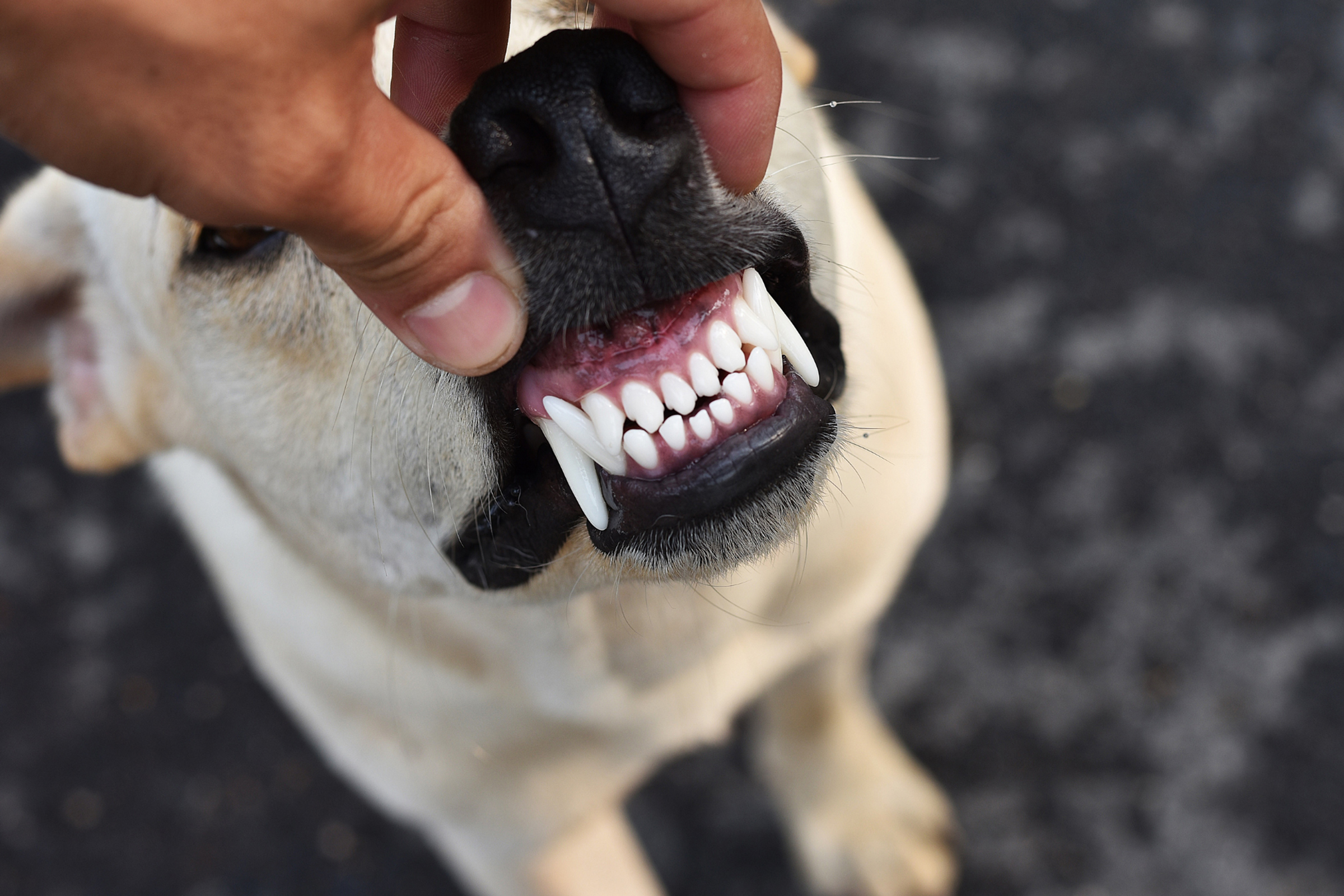
Periodontal disease, the most common clinical condition in adult dogs, underscores the importance of diligent dental support – and the earlier you start, the better! From the moment a tooth appears, it’s exposed to food, saliva, and pathogenic bacteria.
This disease develops when an accumulation of bacteria in the mouth creates plaque. Over time, plaque hardens into calculus, also known as tartar, settling at the gum line and leading to gums’ redness, inflammation and bleeding, termed gingivitis. If left unchecked, dental distress progresses to periodontitis, a condition where the connective tissues and bones that hold teeth in place can break down, leading to tooth loss.
Gingivitis is reversible with good oral hygiene and professional dental cleanings. Monitoring your dog’s dental integrity and providing necessary care will help prevent potential issues and ensure their overall well-being, including their oral health.
Signs of Poor Hygiene and Dental Disease
Recognising the signs of poor dental integrity in your dog is the first step in preventing more severe issues. Indications of inadequate oral hygiene in dogs may include:
- Doggy breath
- Difficulty eating
- Swollen gums
- Loose teeth
- Food or toys with blood on them
Promptly addressing any of these signs is key to avoiding dental complications.
However, some symptoms are more specific and indicate that a vet visit is advisable:
- Red or bleeding gums
- Plaque
- Bad breath
- Blood in water or food bowls
- Thick saliva
- Facial swelling
- Avoiding hard food or treats
- Pawing at mouth
- Excessive drooling
- Dropping food while eating
- Can’t open or close mouth
By being vigilant and paying attention to these signs, you can ensure your dog’s dental health remains in top condition. Early detection and treatment are crucial in preventing more serious health issues down the road.
Smaller breeds and brachycephalic ones, such as Pugs, Chihuahuas, and Bulldogs, have an increased risk of developing periodontal disease. They typically have poorly aligned jaws, missing teeth, or their teeth tend to be more closely packed, making it easier for food and bacteria to become trapped. Intriguingly, it’s widely believed that the inflammation and subsequent tissue damage from periodontal disease arise more from a misregulated immune response to bacterial infection than the bacteria themselves.
As a general rule, smaller breeds tend to have this condition more often than bigger dogs because food gets trapped easier between smaller teeth. Additionally, they have less bone mass or develop maligned bites, which further exacerbates the problem.
This implies that dogs with immune-related health issues might be more susceptible to dental diseases. This insight further underscores the significance of maintaining a healthy immune system for your pet.
Early detection of dental deterioration is vital in preventing more severe complications. Regular checkups with your veterinarian and at-home dental support can help detect and address issues before they progress. Don’t wait until it’s too late – take action to ensure your dog’s teeth, gums and oral hygiene are in top shape.
Which Dog Breeds Are Particularly Prone to Periodontal Disease?
Many dog breeds are susceptible to periodontal disease, with smaller breeds being especially vulnerable. Here are some breeds that frequently encounter dental issues:
- Pugs: Their compact dental structure often leads to food getting trapped between teeth.
- Collies: This breed can develop periodontal problems due to misalignment in their bites.
- Yorkshire Terriers: Known for their petite mouths, Yorkies often face challenges with oral hygiene.
- Chihuahuas: With minimal bone mass, Chihuahuas are prone to gum and tooth issues.
- Dachshunds: Their narrow jaws make them candidates for dental disease.
- Boxers: Despite being larger, Boxers can also suffer from misaligned bites and dental problems.
In general, smaller breeds tend to experience periodontal disease more frequently than their larger counterparts. Factors contributing to this include tighter spaces between teeth, less bone support, and a higher incidence of malocclusions. Regular dental care is essential for maintaining their oral health.
Consequences of Neglecting Dental Care
Neglecting your pet’s dental needs can result in tooth loss, diseased gums, and even damage to vital organs such as the heart, kidneys, and liver.
Dental disease, such as tooth loss, may result from periodontal disease caused by the accumulation of plaque and tartar on the teeth. Conversely, gum disease is caused by the accumulation of plaque and tartar on the teeth, which can result in inflammation and infection of the gums. Organ damage can be caused by the spread of bacteria from the oral cavity to other areas of the body, including the heart, kidneys, and liver.
Immediate Consequences
The consequences of poor dental care in dogs can vary widely:
- Swollen Gums: Initially, poor dental hygiene leads to swollen and irritated gums.
- Tooth Loss: If neglected, this can progress to more severe conditions such as tooth loss.
Long-term Consequences
- Organ Damage: Bacteria from dental infections can spread to vital organs, leading to serious conditions affecting the heart, kidneys, and liver.
By understanding both the immediate and long-term impacts of poor dental care, you can take proactive steps to ensure your pet’s overall health and well-being. Regular dental check-ups and proper dental hygiene are crucial to preventing these serious health issues.
Regular dental checkups, a balanced diet inclusive of dental diets, and promoting healthy chewing habits are recommended to reduce the risk of dental disease.
By taking preventative measures and addressing the symptoms of dental disease early on, you can help your dog avoid the consequences of neglect. Remember, your dog’s dental health is essential to their overall well-being, and it’s up to you to ensure they receive the proper care they need.
Approximately four out of five dogs, which equals 80%, develop some type of periodontal disease within their first two years.
Professional Dog Teeth Cleaning: What to Expect
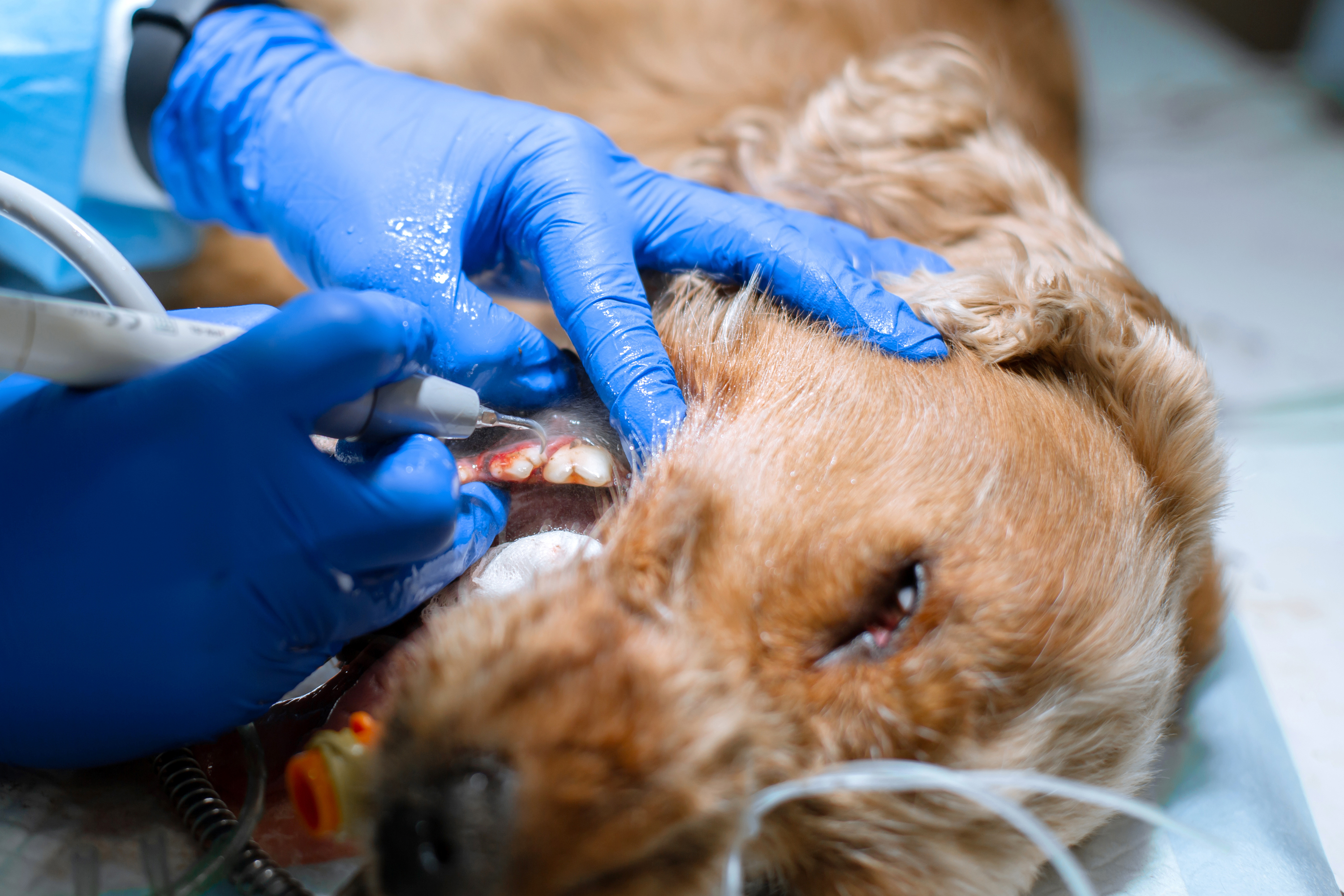
Though at-home dental maintenance plays a significant role in maintaining your dog’s dental integrity, professional teeth cleaning is still integral to their oral hygiene. The dental procedure used for professional dog teeth cleaning includes:
- The use of anaesthesia
- Performing an oral examination
- Scaling
- Polishing
This procedure is critical to preserving your dog’s dental integrity and can assist dog owners in avoiding gingivitis, periodontal disease, and other dental issues.
Frequency of Professional Cleanings
The frequency of professional teeth cleanings depends on your dog’s size and breed, with smaller dogs typically requiring more frequent cleanings. Vets usually recommend having professional teeth cleaning once or twice a year. However, more frequent cleanings may be necessary, depending on your dog’s specific needs.
Regular professional dog dental cleaning can help maintain your dog’s dental integrity and prevent more severe issues such as periodontal disease. Scheduling cleanings at the appropriate frequency is a proactive approach to your dog’s dental requirements, ensuring their teeth and gums stay in optimal condition.
Finding a Qualified Veterinarian
Choosing a qualified veterinarian experienced in dentistry is essential to ensure the best treatment for your dog. Professional dog teeth cleaning, performed by trained veterinarians, involves inspecting the pup’s teeth, gums, and mouth for dental disease such as tooth decay or abscesses. The cleaning process typically includes ultrasonic and hand scaling to remove plaque and tartar above and below the gum line, which is important for maintaining dogs’ dental well-being.
When searching for a qualified veterinarian, it is essential to investigate their credentials and experience. Here are some steps you can take:
- Request references from other pet owners.
- Read online reviews of the veterinarian.
- Contact the South African Veterinary Council (SAVC) to validate the veterinarian’s credentials.
The advantages of engaging a qualified veterinarian are numerous. They possess the expertise to accurately diagnose and treat your dog’s dental well-being. Furthermore, they can advise on maintaining your dog’s dental regime and ensure optimal care.
At-Home Dog Teeth Cleaning Methods
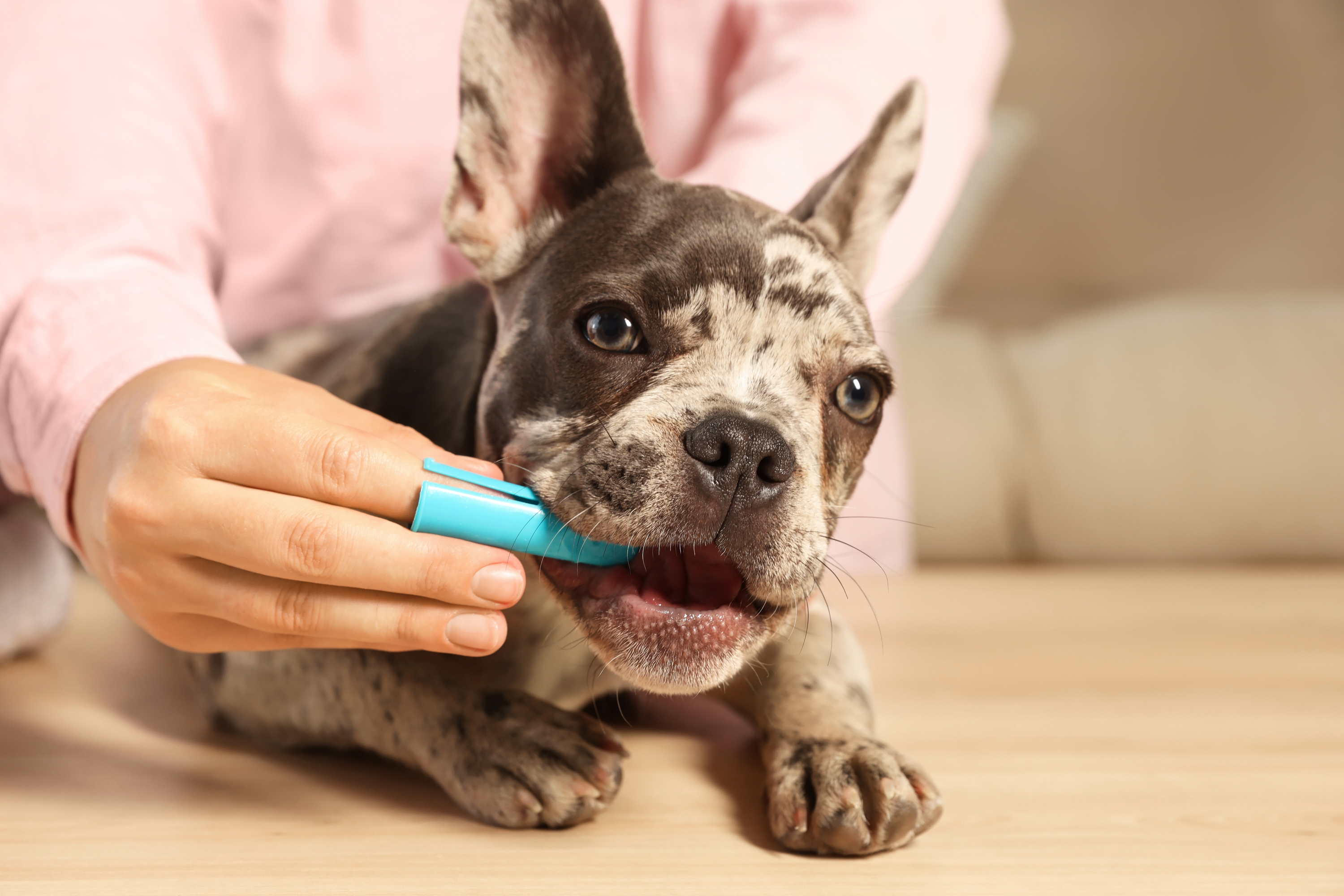
At-home teeth cleaning methods play a significant role in maintaining your dog’s dental health between professional cleanings. Brushing, dental treats and chews, water additives and food supplements are all effective methods for keeping your dog’s teeth clean and healthy. By incorporating these methods into your dog’s daily routine, you can ensure their oral health remains in top shape.
Brushing is still the most effective way to clean your dog’s teeth. Regularly brushing your dog’s teeth helps remove plaque and tartar build-up, lessening the chances of developing dental disease. On the other hand, dental treats and chews are specially designed toys that aid in cleaning teeth while providing a very tasty treat and reward for your dog. They can help maintain your dog’s dental hygiene by removing plaque and tartar, which contribute to periodontal disease.
Water additives and food supplements are products designed to soften and eliminate plaque to support your dog’s health and prevent disease. Some notable options include:
- DentaMax Powder: 100% seaweed product renowned for its antibacterial and antimicrobial properties. It effectively inhibits bacterial growth, reducing plaque deposits, combatting tartar and fighting off bad breath. Its natural composition ensures no side effects while effortlessly eliminating doggy breath and delivering clean teeth.
- TropiClean Fresh Breath Water Additive: made with natural ingredients
- Virbac C.E.T. AquaDent: contains a natural probiotic to help control bad breath from digestive origins
Products like TropiClean Fresh Breath Water Additive and Virbac C.E.T. AquaDent provide supplemental care between professional dental cleanings. But the real hero for at-home teeth cleaning is DentaMax Powder, an easy-to-use natural product that blends seamlessly with your dog’s routine, ensuring your pet’s teeth stay clean and healthy.
BEST SELLER
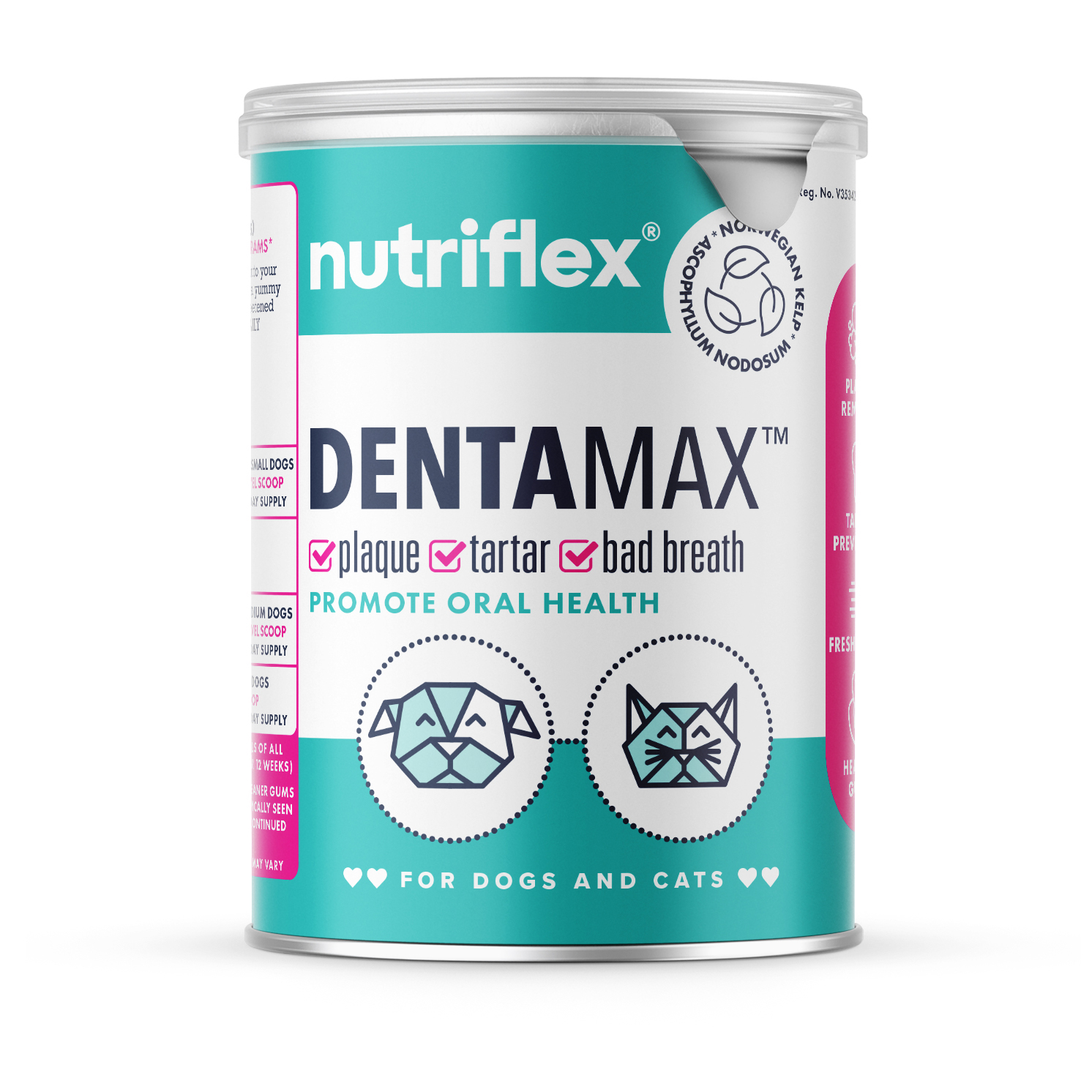
PLAQUE TARTAR BAD BREATH
DentaMax Dental Powder for Dogs and Cats
348 Reviews
The secret to fresh breath and clean teeth powered by clinically proven seaweed. The result is visibly whiter teeth, cleaner gums and fresher breath for your pet within just 3 - 12 weeks. No tooth brushing is required.
- Eliminate bad breath
- Remove plaque accumulation
- Prevent tartar, tooth decay and gum disease
Brushing Your Dog’s Teeth
Regular brushing is one of the most effective ways to clean your dog’s teeth. Brushing your dog’s teeth and using toothpaste with a finger brush or toothbrushes specifically designed for dogs, as human toothpastes contain ingredients that can be detrimental to dogs, such as fluoride.
By brushing your dog’s teeth daily, you can help eliminate plaque and tartar build-up, lessen bad breath, and avert diseased gums and serious dental problems.
Brushing your dog’s teeth is straightforward. Here’s how to do it:
- Squeeze a small amount of dog-specific toothpaste onto a toothbrush.
- Brush gently on all teeth from various angles.
- It is recommended to brush a dog’s teeth at least once daily.
- If you notice blood on the toothbrush while brushing your dog’s teeth, it’s crucial to have them examined by a veterinarian to rule out the possibility of periodontal disease.
A slow start and consistent routine can make the brushing process more comfortable for your dog. With patience and perseverance, you can make teeth brushing a regular part of your dog’s routine, ensuring their dental health remains in optimal condition.
Dental Treats and Chews
Dental treats and chews can help remove plaque and tartar while providing a tasty reward for your dog. They come in various forms, sizes, and flavours and can help reduce the accumulation of plaque and tartar that contribute to gingivitis and dental disease. Incorporating dental treats and dog chews into your dog’s routine can contribute to improved tooth and gum health.
When selecting dental treats and chews for your dog, it is important to ensure that the products are specifically designed for dogs, as they are more effective and safer for your pet.
Providing dental treats and chews for your dog helps maintain their dental integrity, offers mental stimulation, and promotes healthy chewing habits. Be sure to choose products appropriate for your dog’s size and chewing preferences to ensure the best results.
Water Additives and Food Supplements
Water additives and food supplements can support dental cleaning by breaking down plaque and tartar and improving breath. DentaMax Powder, for example, consists of 100% seaweed and works by breaking down the bacterial biofilm that contributes to the formation of dental plaque and tartar. These products offer an additional option for maintaining your dog’s dental condition between professional cleanings and at-home teeth brushing.
It’s important to read the label and follow the instructions carefully when using water additives and food supplements to avoid potential toxicity. Additionally, it is recommended to consult with a veterinarian before use, as some ingredients, such as the iodine in DentaMax, may not be suitable for pets with hyperthyroidism.
The Benefits of Oral Sprays and Gels for Dogs
Maintaining your dog’s oral health is crucial, and oral sprays and gels can play an essential role in achieving this. Here are some key benefits:
Freshens Breath
- Effective Odour Control: Oral sprays and gels can rapidly combat bad breath, ensuring your dog’s mouth smells pleasant.
- Quick and Convenient: A simple application between brushings keeps your dog’s breath fresh without the hassle of a full cleaning session.
Promotes Dental Hygiene
- Reduces Plaque and Tartar: Regular use of these products can help reduce the buildup of plaque and tartar, which are primary causes of dental disease.
- Easy Application: They are simple to apply, making it easier for pet owners to maintain consistent oral hygiene for their pets.
Soothes Gums
- Anti-inflammatory Properties: Many oral gels contain ingredients that soothe and reduce gum inflammation, providing comfort to dogs with sensitive gums.
- Healing Support: They can also aid in the healing process of minor oral injuries or irritations.
Supports Overall Health
- Prevents Serious Conditions: Good oral hygiene is closely linked to preventing more severe health issues such as heart, liver, and kidney diseases.
- Improves Quality of Life: A clean, healthy mouth can enhance your dog’s overall well-being, leading to a happier, more comfortable life.
By integrating oral sprays and gels into your dog’s regular dental care routine, you can significantly improve their oral health and overall quality of life.
Choosing the Right Dental Products for Your Dog
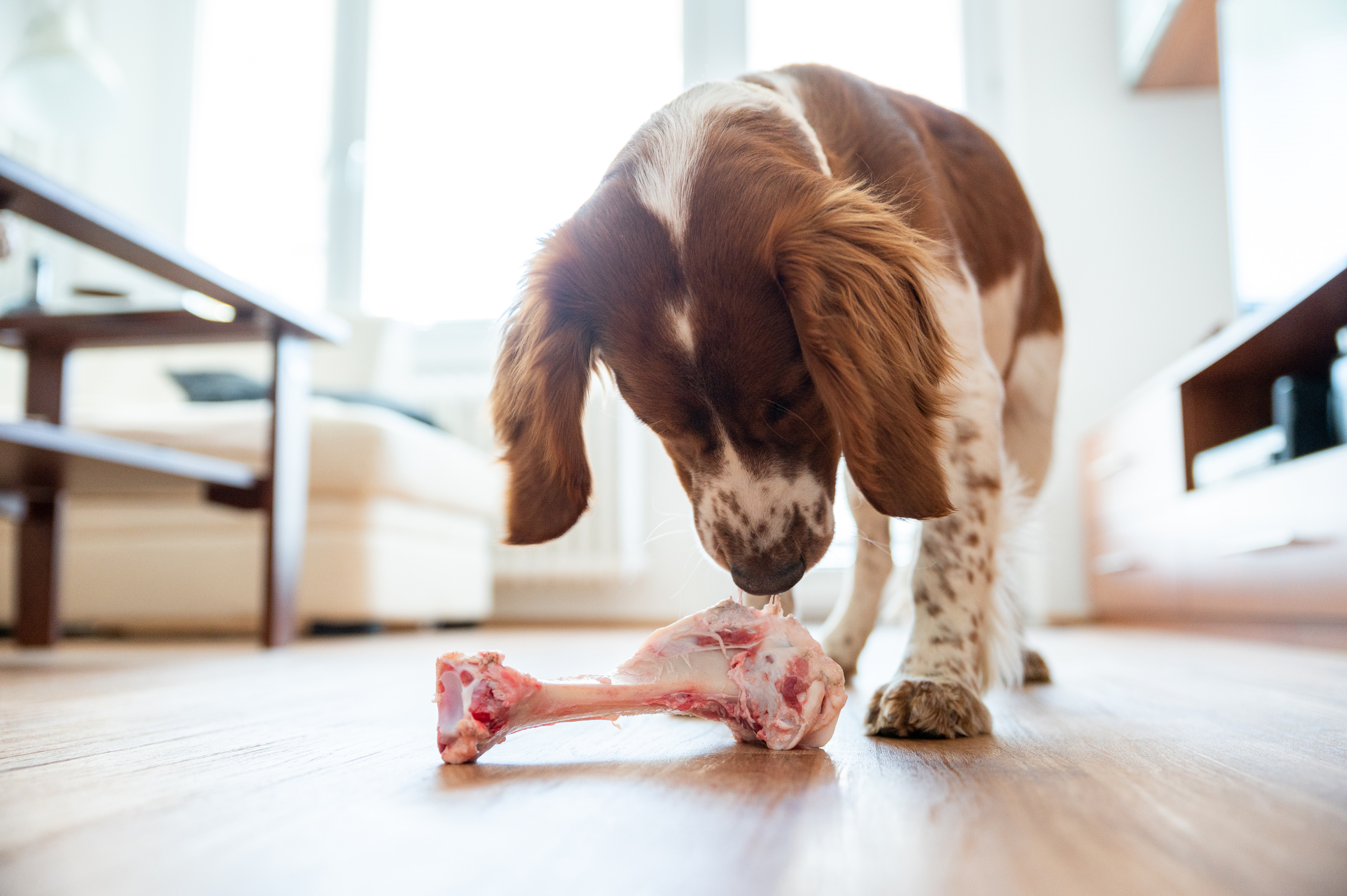
With so many dental products available for dogs, it can be challenging to determine which ones are best for your furry friend. To choose the right dental products, consider your dog’s:
- Size
- Age
- Breed
- The type of product you are seeking
Selecting products specifically designed for your dog’s needs helps maintain their dental well-being.
Whether you’re looking for toothpaste and toothbrushes, professional cleaning, dental treats and chews, or water additives and natural food supplements, selecting products designed specifically for dogs is essential. These products are more efficient and safer for your four-legged friend, ensuring optimal care and preventing potential oral complications.
Following product instructions and maintaining consistency in your dog’s dental routine is essential when using dental products. Regular checkups with your veterinarian, a balanced diet, and proper dental support can help prevent oral issues and ensure your dog’s overall health and well-being.
How Sugary Treats Can Affect a Dog’s Dental Health
Feeding your dog sugary treats might seem like a great way to spoil them, but it can have some significant downsides for their dental health.
Cavity Risk
Just like in humans, sugar can cause cavities in dogs. When sugar remains on their teeth, it creates an environment where harmful bacteria can thrive. This often leads to tooth decay, which can cause pain and discomfort for your pet.
Gum Disease
Excessive sugar can also lead to gum disease. Plaque buildup from sugary treats can irritate the gums, leading to gingivitis or more severe periodontal disease. This not only impacts their teeth but can also affect their overall health.
Bad Breath
Consuming sugary snacks can contribute to bad breath. The same bacteria that cause cavities and gum disease also produce unpleasant odors as they break down sugar in your dog’s mouth.
Tips for Moderation
- Limit Sugar: Keep sugary treats to a minimum and opt for healthier alternatives.
- Dental Chews: Consider giving your dog dental chews designed to clean their teeth while satisfying their craving.
- Regular Brushing: Make brushing your dog’s teeth a regular part of their grooming routine to remove any sugar residue.
By managing their treat intake and focusing on dental care, you can ensure that your furry friend enjoys good oral health and a happier life.
Daily Brushing
Research has shown that daily brushing can substantially reduce bacteria in a dog’s mouth. However, daily brushing becomes less crucial when dogs are fed a species-appropriate diet. Such a diet prolongs chewing time and promotes a healthier environment for beneficial bacteria to keep harmful ones under control.
Without a species-specific diet, regular, preferably daily, brushing combined with a premium dental food supplement such as DentaMax is essential for maintaining your pet’s oral hygiene and health.
Starting teeth cleaning routines early, ideally from puppyhood, increases the likelihood of your dog accepting it. Begin by letting them get familiar with the toothbrush and toothpaste. Over time, they’ll grow more comfortable, allowing for longer brushing sessions.
Another advantage of introducing teeth cleaning early on is the ability to monitor dental development. Puppies will eventually shed their baby teeth as their permanent ones emerge. Sometimes, the adult teeth might come in before the baby teeth have fallen out, leading to overcrowding, a problem especially prevalent in toy and small dogs. This risks injury to other teeth and surrounding soft tissues and heightens the chances of periodontal disease.
By regularly inspecting your dog’s mouth, you can track the shedding of baby teeth and the emergence of adult ones. Additionally, you can examine their bite. Ideally, adult dogs’ should have a scissor bite, where the lower canines sit just outside the upper gum line and ahead of the upper canines.
Toothpaste and Toothbrushes
Using dog-specific toothpaste and toothbrushes is essential for safe and effective cleaning. Human toothpaste contains ingredients such as fluoride that can harm dogs, so choosing dog toothpaste and toothbrushes designed explicitly for canines is crucial. These products can help eliminate plaque and tartar build-up, reduce bad breath, and avert disease.
When selecting dog toothbrushes and toothpaste, look for products specifically designed for canines. A range of toothpaste and toothbrushes are available for dogs, including enzymatic toothpaste, flavoured toothpaste, and toothbrushes specifically designed for small and large dogs.
To ensure the best results, use a minimal amount of toothpaste, brush your dog’s teeth gently, and reward your dog following brushing. Using dog-specific toothpaste and toothbrushes aids in maintaining your dog’s oral hygiene and avoiding potential complications.
Dental Treats and Chews
Offering suitable chew toys and treats can play a pivotal role in maintaining your dog’s oral hygiene and health. They not only help in removing plaque and tartar but also strengthen the jaw muscles and offer mental enrichment.
Choosing the right chew toy can be challenging. Many commercially advertised chew toys, including dental chews, often contain inferior and unsuitable ingredients.
Raw bones are a standout option for minimising pathogenic bacteria in the mouth. The added advantage? You’re fully aware of what you’re feeding your pet. There’s no lengthy ingredient list to sift through.
If you decide on raw, meaty bones, ensure they’re appropriately sized for your dog. Chicken necks and wings are excellent choices to begin with. These natural products offer a convenient and effective way to support your dog’s oral hygiene in conjunction with regular teeth brushing and dental checkups.
While there is some debate around feeding raw bones to dogs, they can be a healthy and tasty treat for your dog and naturally aid in teeth cleaning by scraping off tartar and plaque. However, bones are choking hazards and also present a risk of injury if not done correctly. Energetic eaters risk dental fractures, and because bones are high in calcium, too much of a good thing can lead to constipation. Meanwhile, never feed your dog cooked bones because these tend to splinter, posing internal threats. Always monitor your dog while they chew to ensure safety.
Water Additives and Food Supplements
Choosing water additives and food supplements that are safe and effective natural options for your dog’s dental well-being is imperative. These at-home-care products can help reduce plaque and prevent the build-up of tartar, freshen breath, and maintain dental hygiene.
Some popular options include DentaMax Powder, 100% seaweed, and dental water additives that can be easily added to your dog’s drinking water.
Incorporating water additives and food supplements into your dog’s dental routine helps maintain their oral health and keep their teeth clean and strong. These products offer a convenient and effective way to support your dog’s oral hygiene in conjunction with regular teeth brushing and natural dental treats:
- Coconut Oil Chews: Coconut oil has natural antibacterial and antifungal properties. Freezing small amounts of coconut oil can create a tasty and beneficial treat for dogs, helping to reduce bad breath and promote healthy gums.
- Carrots: These crunchy vegetables are not only a healthy, low-calorie treat but also act as a natural toothbrush. Chewing raw carrots can help rub off some of the plaque that builds up on a dog’s teeth.
- Parsley Sticks: Parsley has natural breath-freshening properties. You can blend parsley with a bit of water and freeze the mixture in ice cube trays to create a refreshing, plaque-fighting treat.
- Apples: Slices of apples can help clean a dog’s teeth and freshen their breath. They provide a good source of fibre, vitamins A and C, and are low in protein and fat. However, make sure to remove the seeds and core, as they can be harmful to dogs.
Tips for Preventing Dental Problems in Dogs
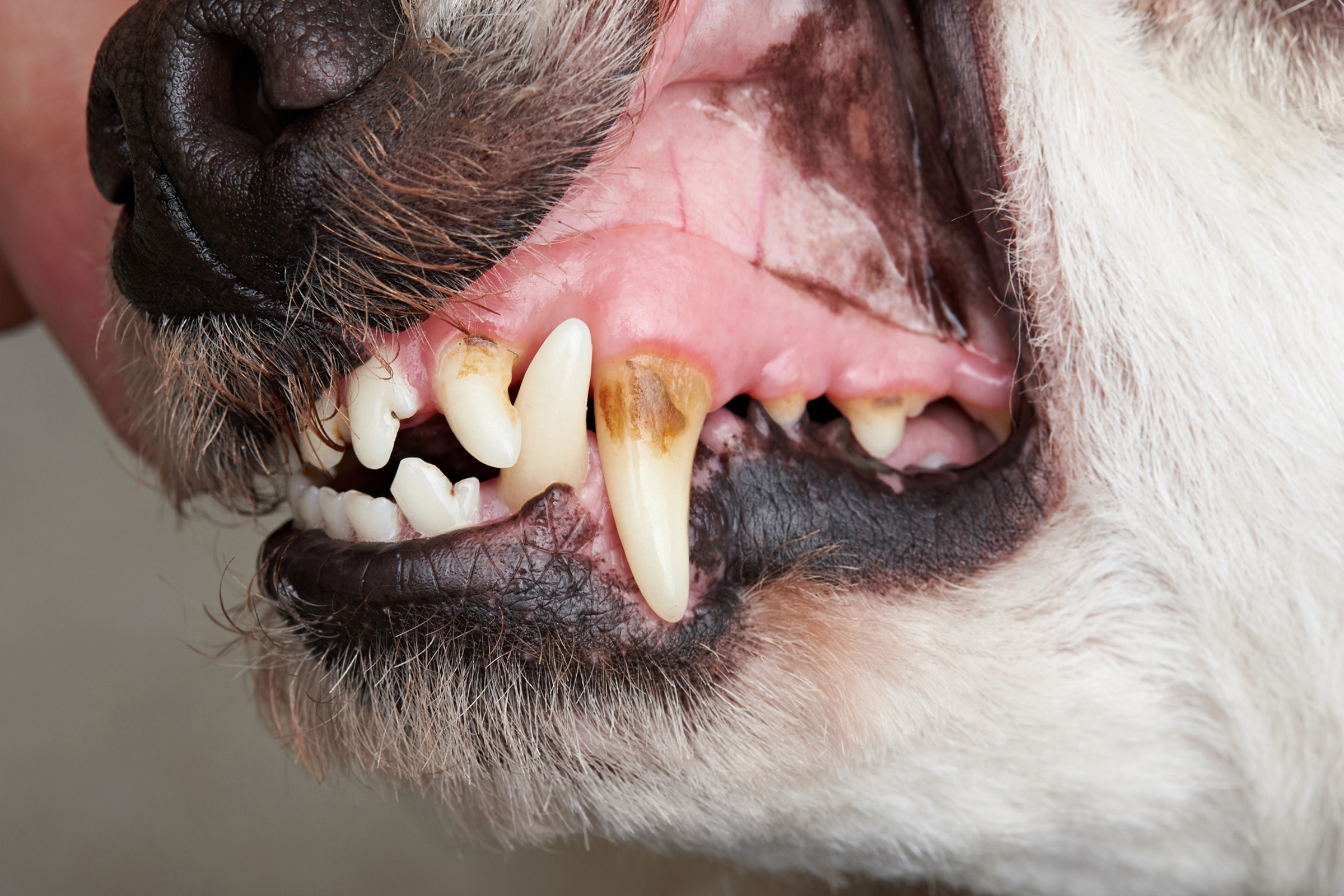
Preventing dental disease in dogs involves scheduling regular checkups, providing a balanced diet, and encouraging healthy chewing habits. These steps ensure your dog’s teeth and gums stay in top shape and help avoid potential complications.
Regular checkups with your veterinarian can help detect dental issues early and ensure your dog’s overall health. Scheduling at least yearly checkups allows you to monitor your dog’s dental state and address any problems before they escalate.
A balanced diet, including dental-specific food options such as a species-appropriate diet and DentaMax, can support your dog’s dental integrity. Providing suitable chew toys and treats aids in keeping your dog’s teeth clean and gums healthy and strong. Following these tips and remaining proactive in your dog’s dental needs can ensure their teeth and gums stay healthy and prevent potential dental disease.
The Role of Nutrition in Dental Health
Nutrition has a direct impact not only on your dog’s oral health but also on the strength of their teeth. By feeding your dog a specially formulated diet, you can boost the health of their bones and teeth. Foods that contain essential vitamins and minerals support the healthy development and maintenance of joints, strong bones, and the overall well-being of all body systems.
- Balanced Diet: Ensure your dog’s diet includes high-quality ingredients tailored for dental health.
- Vitamins and Minerals: Look for foods fortified with essential vitamins and minerals crucial for bone and teeth strength.
- Special Formulations: Consider diets specifically designed for dental and joint care, which can provide comprehensive health benefits.
Combining a balanced, nutrition-focused diet with other dental care practices like chew toys and treats will help maintain your dog’s dental hygiene. This holistic approach ensures that your pet enjoys not only a healthy mouth but also overall robust health.
Regular Checkups
Regular checkups with your veterinarian can help detect issues early and ensure your dog’s overall health. Scheduling at least yearly checkups allows you to monitor your dog’s dental state and address any problems before they escalate.
In addition to annual checkups, it’s important to consult with your veterinarian if you notice any signs of dental disease in your dog, such as:
- bad breath
- difficulty eating
- swollen gums
- excessive drooling
- loose teeth
Early detection and intervention can prevent more severe issues and ensure your dogs teeth remain in top shape.
Balanced Diet
A balanced diet, including dental-specific food options, can support your dog’s healthy smile. These food options are designed to generate more contact with the teeth than traditional kibble, helping to keep your dog’s teeth clean and healthy.
Avoid ultra-processed foods. Ultra-processed food is defined as any food that undergoes multiple processes like extrusion and milling. They may also contain added ingredients that are highly manipulated. Sadly, many dry-based dog foods fall directly under this definition.
Historical studies on human Hunter-Gatherer populations reveal that tooth cavities and gum diseases were uncommon. Even today, indigenous people following traditional lifestyles only face dental disease once they incorporate a Western diet.
This phenomenon can be attributed to several factors. Like the gut, the mouth houses its unique microbiome – a community of microorganisms. This community works in harmony, where beneficial bacteria suppress the harmful ones. Ultra-processed foods, however, disrupt this harmony not just in the mouth but throughout the digestive system.
It’s worth noting that a significant portion of our immune system resides in the gut. This system is instrumental in directing our body’s immune responses. Earlier, we discussed the idea that the primary harm in the mouth might not be due to harmful bacteria alone but an imbalanced immune reaction.
Given these insights, we strongly recommend eliminating ultra-processed foods from the diet to promote oral and gut microbiome health.
Encouraging Healthy Chewing Habits
Encouraging healthy chewing habits in your dog can help keep their teeth clean and strong. Chewing stimulates saliva, which produces anti-bacterial agents, helping to keep the mouth clean.
Not only this, but the abrasion that occurs during chewing helps to scrape deposits off the teeth.
What type of chew is best? Here’s what the data suggests:
• Raw bones reduced mouth bacteria by 79%
• Daily brushing reduced it by 70%
• Commercial dental chews reduced it by 54-60%
Offering suitable chew toys and treats can play a pivotal role in maintaining your dog’s oral health. They not only help in removing plaque and tartar but also strengthen the jaw muscles and offer mental enrichment.
Choosing the right chew toys can be challenging. Many commercially advertised chew toys, including dental chews, often contain inferior and unsuitable ingredients.
Raw dog bones are a standout option for minimising bacteria in the mouth. The added advantage? You’re fully aware of what you’re feeding your pet. There’s no lengthy ingredient list to sift through. If you decide on raw bones, ensure they’re appropriately sized for your dog. Chicken necks and wings are excellent choices to begin with.
Summary
In summary, the dental health of your canine friend isn’t just about clean teeth and fresh breath; it’s intrinsically linked to their overall health and vitality. The insights and strategies shared in this article underscore the need for a consistent and proactive approach to your pet’s dental necessities.
From regular vet visits to a nutritious diet to at-home dental rituals like brushing and employing dental supplements, every step counts. Safe and effective products like NutriFlex DentaMax powder offer an added layer of protection, making the process even more effective.
Don’t wait until it’s too late – Every day is an opportunity to protect your dog’s dental health. Begin today and gift your pet the radiant health they genuinely deserve.
Frequently Asked Questions
Should dogs get their teeth cleaned?
Regular dental cleaning is essential for a dog’s health, as it helps avoid plaque build-up and the uncomfortable dental problems that come with it. Dogs should get their teeth cleaned at least once a year by a licensed veterinary dentist.
How can I get plaque off my dog’s teeth?
Regularly brushing your dog’s teeth with a soft toothbrush and dog-safe toothpaste is the best way to remove plaque from their teeth. Start early and be gentle as you brush and rinse clean teeth thoroughly for optimal results.
How much does it cost to clean your dog’s teeth in South Africa?
Getting your pet’s teeth cleaned in South Africa requires an ultrasonic dental descaling procedure with general anaesthesia, costing around R 3000 to R 4000.
How often should I have my dog’s teeth professionally cleaned?
To maintain optimal oral hygiene and health, professional teeth cleaning for your dog should be scheduled at least once or twice a year. Regular brushing at home is also essential for your pet’s dental hygiene. Brushing should be done at least three times a week.
Can I use human toothpaste to brush my dog’s teeth?
Using human toothpaste to brush a dog’s teeth is not recommended, as it contains ingredients that can harm canines. It is essential to use toothpaste and toothbrushes specifically designed for dogs.
Are Cavities a Common Issue in Dogs?
Cavities in dogs are not as prevalent as dental problems found in humans. The unique structure of their teeth plays a major role here. Unlike human teeth, canine teeth are designed to tear through meat and bones, which inherently cleans their teeth by reducing plaque buildup.
Additionally, dogs rarely consume sugary foods, a primary cause of cavities in humans. Their typical diet usually includes kibble, meats, and other non-sweet items, limiting the exposure to sugars that can lead to cavities.
However, it’s important to note that if your dog frequently indulges in sugary treats, the chances of developing cavities increase. The occasional sweet treat is okay, but moderation is vital to maintain their dental health.
Key Points:
- Structure of Canine Teeth: Designed to reduce plaque buildup naturally.
- Diet: Limited intake of sugary foods compared to humans.
- Moderation Is Key: Regular sugary treats can increase the risk of cavities.
By understanding these aspects, you can better maintain your dog’s dental hygiene and minimise the risk of cavities.
Functions of a Dog’s Canines and Carnassial Teeth
Dogs have specialized teeth that perform distinct roles, crucial for their survival and functionality.
Canines: These are long, pointed teeth prominently visible in a dog’s mouth. Their primary functions are:
- Lifting: Helping dogs pick up and carry objects.
- Pulling: Assisting in pulling things, such as when they play tug-of-war.
- Grasping: Enabling a firm hold on toys, food, or prey.
- Biting: Crucial for defense and tearing food apart.
Carnassial Teeth: These are larger teeth located towards the back of the mouth on each side and serve specific functions:
- Slicing: Acting like scissors to slice through meat and other food items.
- Chewing: Breaking down food into smaller, more digestible pieces.
By working together, these teeth allow dogs to effectively process their food and manage a range of activities related to biting and holding.
Why Are Cavities Rare in Dogs Compared to Humans?
Cavities are uncommon in dogs, a fact that may surprise many pet owners. Here are the main reasons why:
1. Tooth Structure: Dogs possess teeth that differ significantly in shape and function compared to human teeth. The shape of a dog’s teeth is designed primarily for tearing and grinding meat, which naturally reduces the risk of food particles getting stuck and forming cavities.
2. Diet Composition: A dog’s diet typically lacks the high sugar content found in many human diets. Unlike humans, who often consume sugary snacks and beverages, dogs generally don’t ingest sugar to the same extent. This lower sugar intake means there’s less opportunity for harmful bacteria to form and produce the acids that cause tooth decay.
3. Sugary Treat Warning: While cavities are rare, it’s still important to be cautious with treats. Regularly giving your dog sugary snacks can indeed lead to cavities over time. It’s best to indulge your furry friend in moderation and opt for treats specifically designed to be dog-friendly.
Key Takeaways:
- Tooth Structure: Designed to minimize food residue.
- Diet: Naturally low in sugars.
- Moderation: Be mindful of sugary treats.
By understanding these factors, you can help keep your dog’s dental health in check and avoid any unexpected trips to the vet for tooth-related issues.
Comparing a Dog’s Root Structures to Human Root Structures
Both dogs and humans share similarities in dental root structures, yet there are distinct differences that set them apart. In humans, each tooth’s root varies depending on the type of tooth and its location. Typically, human molars have three or more roots in the upper jaw and two roots in the lower jaw.
Dogs, on the other hand, have a unique arrangement:
- Upper Molars: Each of the three upper molars usually has two roots.
- Lower Molars: The two lower molars generally have three roots each.
This variance underscores the differences in dietary needs and evolutionary adaptations between dogs and humans. Understanding these distinctions can provide valuable insights into each species’ oral health and dietary requirements.
How Many Permanent Teeth Do Adult Dogs Have?
Adult dogs typically have 42 permanent teeth. Puppies are initially born with 28 baby teeth, also known as deciduous teeth. Around four to six months of age, these baby teeth begin to fall out, making way for the adult set. By the time the process is complete, an adult dog will have a full set of 42 permanent teeth.
Age When Puppies Start Losing Milk Teeth
Puppies typically begin to lose their milk teeth between 4 to 6 months of age. This process, known as exfoliation, marks the transition from their deciduous teeth to their permanent set of adult teeth. By the time they are fully grown, most dogs will have 42 permanent teeth.
During this teething period, you might notice your puppy chewing more than usual. This is normal behavior as they try to alleviate the discomfort that comes with losing baby teeth and growing in their adult ones.
Key Points to Remember:
- Age Range: 4 to 6 months
- Teeth Transition: 28 milk teeth to 42 permanent teeth
- Signs: Increased chewing behavior
Keep an eye on your puppy’s dental health during this stage to ensure a smooth transition into their adult teeth.
How Many Deciduous Teeth Do Puppies Have?
Puppies are born with a complete set of baby teeth, also known as deciduous teeth. These teeth start to emerge at about two to four weeks of age. In total, puppies have 28 baby teeth, which they use until their adult teeth come in.
The teething process can be just as uncomfortable for puppies as it is for human babies, so it’s important to be patient and provide appropriate chew toys to help them through this stage.